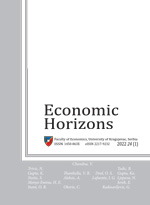Fiscal consolidation in the EU-28: Multiyear versus cold-shower episodes
Olgica Glavaski and Emilija Beker Pucar
Faculty of Economics in Subotica, University of Novi Sad, The Republic of Serbia
In the aftermath of the global recession, the need for fiscal consolidation in order to reduce budget deficits and the public debt has intensified, but with the aim to make the measures applied not affect the further slowdown of the economic activity in the European Union (EU) economies. In this paper, the episodes of the fiscal consolidation in the period from 1990 to 2015 in the 28 EU economies are analyzed, differentiating the multiyear episodes against the one-year (i.e. cold shower) episodes and their effects before and after the global recession. The episodes of the fiscal consolidation that result in successful (a reduction in the cyclically-adjusted primary budget deficit) and expansionary effects (the GDP growth) are identified, thus empirically confirming the existence of non-Keynesian effects. The stated affirms the idea that the achievement of fiscal sustainability by using austerity measures does not necessarily imply contractions in economies and that the development of a fiscal architecture in the EU by establishing complementarity between the national and supranational fiscal rules is of extraordinary importance in the post-crisis period.
Keywords: fiscal consolidation, EU economies, fiscal rules, non-Keynesian effects
JEL Classification: H30, H62, F15




